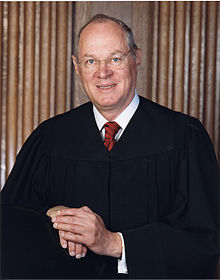For instance, Justice Anthony Kennedy, who is widely regarded as the "reasonable centrist" in this group, seems to believe that the Constitution made each state an "independent sovereign." He used that phrase last Wednesday in oral arguments on whether to strike down the Voting Rights Act and especially Section Five, which requires jurisdictions with histories of racially motivated voter suppression to get federal court permission before changing their voting laws.
The problems caused by that language led to the convening of the Constitutional Convention in Philadelphia in 1787. The idea of 13 "independent" and "sovereign" states had proven unworkable, so George Washington, James Madison and other Framers jettisoned it in favor of national sovereignty invested in "We the People of the United States."
General Washington, who presided at the convention, was a particular foe of state "sovereignty" because he and his revolutionary soldiers had suffered under the chaos of 13 "independent" states failing to meet obligations to fund and equip the Continental Army. That chaos then continued through the first years of independence.
So, the Constitutional Convention ignored its instructions to simply propose amendments to the Articles of Confederation and instead threw them out altogether, including Article Two which read: "Each state retains its sovereignty, freedom, and independence, and every power, jurisdiction, and right, which is not by this Confederation expressly delegated."
In the Articles of Confederation, national sovereignty was specifically denied the central government, which was not deemed a nation or government but simply a "firm league of friendship." That power relationship was essentially flipped by the Constitution, which made federal law supreme and left the states responsible mostly for local matters.
Rewriting the History
The consolation prize that the states got was the Tenth Amendment which, in effect, replaced Article Two of the Articles of Confederation and must be read in comparison to that language of "sovereignty, freedom, and independence." The Tenth Amendment simply states that "the powers not delegated to the United States by the Constitution, nor prohibited by it to the States, are reserved to the States respectively, or to the people."
Though the modern American Right has sought to make the Tenth Amendment a central governing principle -- claiming that it tightly constrains the federal government and gives broad authority to the states -- the amendment was really a rhetorical sop to the Anti-Federalists. It had very little meaning since the Constitution granted sweeping powers to the Congress and to the President, which is why the Anti-Federalists fought so hard to block ratification.
But the Right's narrative of the nation's Founding often ignores why the Constitution was written, i.e., to obliterate the failings of the Articles of Confederation. By deleting that key part of the story, the Right can pretend that the Framers were seeking a weak central government and were enamored of states' rights, when nearly the opposite was true.
So, you'll hear in the ubiquitous right-wing media this "scholarship" about how the Framers wanted the states to be "sovereign" and "independent." But what was alarming about Kennedy's remark is that it appears this bogus narrative has now seeped into the U.S. Supreme Court, where the right-wing justices seem to believe the Articles of Confederation are still in force. [For more on this history, see Robert Parry's America's Stolen Narrative.]
Kennedy is seeing language that is not in the Constitution. One has to begin to wonder if he is he simply in thrall to the right-wing faux history, or is he just another political activist masquerading as a justice, eager to do what he can to insure that a Republican succeeds President Barack Obama and then will appoint new right-wing justices when some of the current ones retire.
In this apparent pursuit of a permanent right-wing majority on the Supreme Court, Chief Justice John Roberts presented his own sloppy reasoning for striking down Section Five of the Voting Rights Act. He claimed -- without providing a source -- that the proportion of blacks voting in Mississippi is much higher than the number in Massachusetts. Roberts called Mississippi the best and Massachusetts the worst.
But Massachusetts officials, including aides to African-American Gov. Deval Patrick, denied Roberts's claim, and Supreme Court clerks declined to provide data to support the Chief Justice's claim, which apparently originated in a dubious reading of Census data.
But the central flaw in Roberts's argument -- even if his numbers were right -- is that no one is alleging that Massachusetts has a history of Jim Crow laws suppressing the black vote. Mississippi does. And it's fair to say that the Voting Rights Act is a principal reason the black vote is as high as it is.
Voting as "Racial Entitlement'
Rounding out the right-wing justices' efforts to transform the high court into what sounds more and more like a Fox News' pundit panel, Justice Antonin Scalia threw in his cranky notion that the Voting Rights Act was a "perpetuation of racial entitlement," suggesting that the right of blacks to vote was some kind of federal government handout.
(Note: You can view every article as one long page if you sign up as an Advocate Member, or higher).






